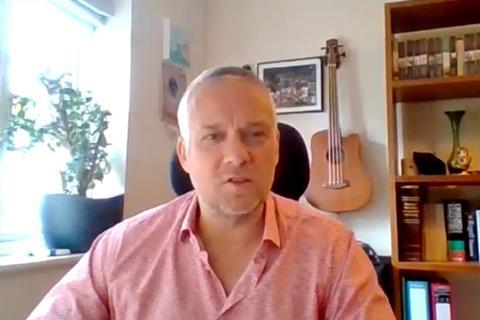What is ESG? Why is ESG important? Can a company that adopts ESG also maximise profits? What are the challenges in adopting ESG? Why is demand for ESG is growing? What is the ESG opportunity and how does this tie in with labour shortage? And what about ESG and company culture?

These are big questions
In this ESG guide, we consider the above questions. To help produce this ESG guide, we have interviewed leading experts and, with them, really tried to dive deep and get under the eco-friendly ESG bonnet.
We spoke to:

Martijn Eikelenboom, Managing Partner Global Head of Sustainability Strategy Practice at Arthur D Little, a leading management consultancy.

Cecilia Carlswärd, founding partner at Violet Hill & Co, which focuses on supporting businesses in implementing sustainable transformation.

Stuart Ravens, a highly regarded analyst who focuses on ESG

Damien Stork, Founder at CHX, a consultancy focused on reframing organisational mental health, humanising leadership and creating higher performing, more engaged, kinder businesses.
What is ESG? We hear a lot about it, but what is it?
ESG stands for environment, social and corporate governance; it is a concept that began with investors as a way to help them better understand their investment portfolio. ESG grew out of ethical investing, which tended to be quite simple — primarily, it involved avoiding tobacco and weapons/defence. However, ESG provides nuance.
ESG, what, why and how; Martijn Eikelenboom, Cecilia Carlswärd, Stuart Ravens and Damien Stork on the elevator pitch and tips on implementing ESG
For investors, ESG is not just about investing for good. Instead, there is a growing view that companies that adopt ESG will reap the long-term benefits in greater profitability.
According to BofA Global Research, companies with low carbon emissions have higher valuations relative to profits than companies that do not disclose data on emissions.
ESG is also about company culture — a word you hear often is authenticity. If a company pays lip service to ESG, then its reforms are more likely to be superficial. “We want to look at a companies consciousness,” explained Cecilia Carlswärd, founding partner at Violet Hill & Co.
Stuart Ravens, an analyst who focuses on ESG, recalls a time when he was starting out, and he asked why pension funds, which represent workers who often do care about ethics, didn’t act on behalf of their customers and put pressure on companies to be better? —He was laughed at.
Deep Dive: Stuart Ravens explains what ESG is
But that was the 1990s, “people are far more aware now,” he says; there is recognition that human activity on Earth is impacting the environment.
In practice: ESG means ESG scores and reports.
Various companies produce ESG ratings, including Sustainalytics, S&P, Bloomberg and MSCI, but there are issues. First, there are no clear standards; some ESG scores are more reliable than others. Different criteria are used to create ESG scores; this, in turn, creates a problem of consistency.
The ESG experts we spoke to picked up on the necessity for common standards in ESG reporting.
Martijn Eikelenboom, Managing Partner & Global Head of Sustainability Strategy Practice at Arthur D Little, told us “that every report used slightly different KPIs and definitions, and that this is holding back adoption of ESG.”
There is an analogy with financial reporting — no one questions the necessity of financial reporting — without it, how can investors and shareholders judge the merits of certain companies. Financial reporting can lose its meaning, however, if companies present their results and balance sheets in entirely different ways.
Stuart Ravens explains: “If I am a horrible person, I am not going to tell someone I am on a first date; they are not going to get my criminal record.”
“The big problem with ESG relates to a company being honest and talking about itself in a way it has never done before. That is quite uncomfortable and needs companies to be far more mature. And more willing to talk about aspects of the business that they weren’t comfortable talking about before.”
“I have an energy client who helps companies make more efficient energy use. But when you talk to their clients, they don’t want to talk about how much energy they have saved, perhaps because they don’t want to disclose how much energy they were using.”
“There are very low-quality ESG rating agencies out there. Anyone with staff and access to Google can create an ESG rating. But even more, professional agencies will apply different criteria. For example, some look at what companies are reporting by recourse to company reports. “Others assess the risk environment in which those companies operate. This creates huge disparities in the output.”
” A common standard that is regulated will move ESG further along the line.”
Stuart Ravens
Stuart also warns that data can be twisted. He cites as an example the gender pay gap. Statistics can mislead if you don’t get the whole picture. He offers as an example Boux Avenue, owned by Theo Paphitis, a famous entrepreneur in the UK known for his appearances on the TV show Dragon’s Den.
Boux Avenue is a lingerie company that only employs women in their shops or women designers. Not many men are employed, and those who do, tend to have better-paid jobs at the company — because better-paid jobs are just about the only jobs within the company that they can do. As a result, the gender pay gap at Boux Avenue is 50 per cent. But does that mean the company pays men more for doing the same job? “Obviously it doesn’t.”
He continues: “Some argue that if you break down figures by job type, then the pay gap is much lower. But that doesn’t take into account that company culture tends to benefit men, with men guided into some jobs and women into other jobs.
“How the public consume this data needs to mature too. What would be far better would be a more qualitative discussion of what companies are doing to encourage women to progress in their careers. And with ESG reporting, focused on numbers, which a journalist can leap on, rather than wade through strategy documents.”
On this theme, Martin Eikelenboom talked about the need for education.
Why the need for ESG?
When considering whether or not to pursue an ESG initiative, a number of issues emerge. For some companies adopting ESG is a defensive strategy; for others, it is an opportunity to gain a competitive advantage.
The answers to the question, ‘why do ESG’ are as follows:
- Climate change and other environmental issues are becoming more important in the public’s eyes. Increasingly, they are looking at a company’s ethical standards when buying its products. As a result, good sustainability and staff management policies are becoming key positive features.
- Regulators are, in any case embracing the ESG challenge — it is probably only a matter of time before regulations make ESG a matter of law.
- Labour shortages are forcing companies to look at ways to improve staff retention and become more attractive to potential new recruits. By embracing ESG issues, many companies believe they acquire a major advantage in the labour market.
- Linked to the above, by focusing on certain ESG related issues such as supporting employees’ mental health, many companies are looking at ways to apply ESG to improve productivity.
Many investors and shareholders now insist on good ESG standards as a key criteria for investment consideration.
ESG is also creating a number of risks and opportunities:
- The risk of not being ready to apply ESG when it becomes a must-have, risks losing market presence.
- First mover advantage creating a competitive benefit.
- Becoming more competitive in the labour market
- Productivity — (via improved mental health, lower attrition, positive culture)
Cecilia Carlswärd, founding partner at Violet Hill & Co told us: “I think if you look at companies in the world today, the map might look very, very different in a few decades. Companies that have been around for centuries may not have such a naturally strong position in their market as they have today.”
“If they (companies) don’t act swiftly enough, it could backfire years from now,” warns Martijn Eikelenboom. He cites as an example a decision by a Dutch court that concluded the Dutch state was not doing enough to protect citizens against climate change.” Similarly, a Dutch court has ordered Royal Dutch Shell to reduce its global net carbon emissions by 45 per cent by 2030 relative to 2019 levels.
“There are risks that people will try and bring you to court if you haven’t done enough and they were aware of this.” He compares the ESG risks today with the challenges faced by tobacco firms a few years ago
“Customer perception is changing, and it is changing rapidly.”
Cecilia Carlswärd
“I think that within the coming decade, we will see a lot of change,” said Cecilia Carlswärd. “We can already see the patterns come into play; awareness is starting to be there”, but she cautioned that “it is a step to go from awareness to action.”
Deep dive: the opportunity from ESG by Martijn Eikelenboom
“We are shifting away from the Gordon Gheko greed is good, mindset on running businesses…” says Stuart Ravens. “And it has changed; people are more focused on the long term.”
“It is also about risk. What could be the next PR disaster.”
Stuart Ravens
Stuart continues: “So if you are capitalist to the bones, ESG is vital because it supports risk management, mitigating against the risk of being fined in the future for saying dumping chemicals or bribery.
“In the 1990s, when ethical funds were first launched, unethical funds were very profitable. You can run an incredibly profitable company now and ignore ESG. But what are your profits going to look like in 10 to 15 years to 20 years? That is the question investors are asking.”
He cites as an example how among the main cloud providers, Amazon was slow to adopt 100 per cent green energy and how it came under intense pressure to catch up with Microsoft and Google.
Social media has been a driver of this change. Reputation is a huge issue.
If Investors don’t invest in your business because you failed to meet certain criteria, you don’t have a business.
Stuart Ravens
ESG the elevator pitch
- 1
 Currently reading
Currently readingESG the elevator pitch
- 2
- 3
- 4



























No comments yet